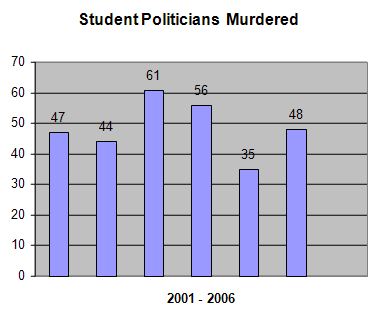

The movement collapsed. The General dissolved his student body, which, since the governing party did not reciprocate, made him immediately popular. But he knew that where democracy could not be practised, popularity would not translate into votes.
Several years were to pass before I could form a coherent picture of what happened to the principal as well as petty actors in the tragedy. With my renewed duties
at the party and the shape I found it in, it took me a year to locate Lalla Rookh.
The reader may be interested in the research I did on student politics in this country; every dead student in my chart below was reduced to — what social scientists call — a statistic. But I had known Nafeez's mother: through her, he survived as a person.

She was a patient in a psychiatric clinic in Dhanmandi. Her family had got her a nice room, overlooking the lake, right across from a luxuriously green island. But it was winter, and the lake was dry, so no boats rowed out there. She was too depressed to look between the grills of her window.
Spring passed, summer disappeared, winter returned. I saw her often, but she was too withdrawn to notice me. I left books, and flowers. Her nurses arranged the volumes on a shelf. A miniature library grew.
As winter hesitated, I found a piece of paper in the pages of a book. She had completed the second half of "The Conversion of Asoka".
And when the coloniser brings his message,
Turn deaf; for the civilisation that creates
Him believes in freedom for the strong,
Slavery for the weak, since twice destroyed
By the barbarian, so centreless.
God, there, will be antithesis of state.
These words, attributed to Asoka, revealed the triumph of her intellect against everything that was negative in her life. When I gradually learned the whole truth, I marvelled how little of the positive was left there. She had fought long with very little to fight with. Perhaps this is how we rise above ourselves, and acquire vision for all.
Another monsoon filled the lake, and the boats appeared, making trips to the inconsequential island. Gradually, she recalled the past to me. I sketched in the details from the files at the party office and the less tangible records lodged in the heads of our intelligence personnel.
At our last meeting, Lalla Rookh had repeatedly mentioned that there was something she had to tell Arif. She had gone home — to the penthouse — and waited for Arif to get back. Meanwhile, he gave instructions to have Nafeez disposed of. The boy had become an embarrassment to the party. His ruthless efficiency had made him hated in the areas in which he operated. The party couldn't bump him off; it could be traced back to HQ. Even a professional hit-man was out of the question. If word got round, it would demoralise the armed cadres. I realised why he had told the boy off before his mother. He was going to be 'retired' soon, anyway; so why not get a woman to stop her nagging at night? True to his genius, Arif asked him to collect a preposterous sum as tax from the stores in his area. When he went there, twirling his gun, the shopkeepers were ready. They beat him to death. Later, it was reported by the press that they had killed an innocent student, who used to attend class regularly. The party was saved.
Arif went home and told her to pack. He was kicking her out. After all, he wouldn't want her around when the news hit the headlines the next day. Lalla Rookh was stunned. She couldn't make out what was happening; but she obediently got her things together. She didn't want to annoy her benefactor. Just before he closed the door on her, she falteringly told him what she'd wanted to.
"Arif was Nafeez's father."
The man changed instantaneously. He grabbed her arm, and pulled her in. His dark face turned a deep shade of black. He made phone-call after phone-call. At last, with gritted teeth, he drove out into the night.
He returned around four in the morning, so I was told by the concierge on duty. Everyone, even the off-duty security guards, had a vivid memory of the night. They remembered the pair coming down the lift, as though they'd had a fight. Lalla Rookh was deathly pale; Arif was the reverse. It was around six, so the chauffeur had come. He put her in the car, gently putting an arm around her, as if to ward off some impending evil. The driver told me that he had given him minute instructions, in a low voice, so as to be inaudible to the lady. He was to take begumsahib to her parents', speak to her father — and only her father, not her mother — and tell him to look after her very carefully all day, never to let her out of his sight. For good measure, the chauffeur, grown loyal to Arif and his family over the years, had stayed with Lalla Rookh that day.
Arif then took the lift to the penthouse, and jumped to bespattered death on the concrete driveway.
Check out Iftekhar's web page at http://www.geocities.com/if6065/farvardin.






















